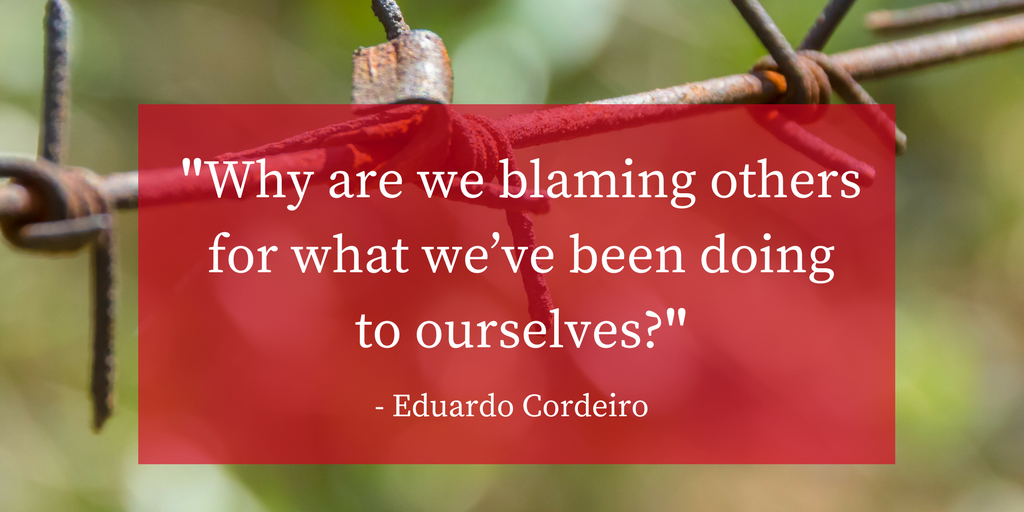Eduardo Cordeiro is a husband, father, and owner of a home remodeling business in Phoenixville, PA. It wasn’t until 2017 that he added author to that list.
Like the rest of America, he spent 2016 watching the presidential campaigns build toward a tense election. A Brazilian immigrant and US resident since 2005, this election was different than any other he’d experienced.
Eduardo watched candidate Donald Trump rally larger and larger crowds with hateful words aimed squarely at immigrants like himself. And it didn’t stop there. Trump was spewing vitriol at women, Muslims, African Americans, and other minority groups.
As Trump’s base chanted “Build the wall!” and called for us to “Make America Great Again,” Eduardo was dumbfounded that so many Americans could be fooled by his lies.
The biggest lie of all? That people like Eduardo are the cause of all of America’s problems. Compelled to disprove this lie, he began putting pencil to paper.
Less than a month into Donald Trump’s presidency, a story began to spill out of Eduardo. In his spare moments between work site visits and time with his family, he started jotting down notes, ideas, and bits of dialogue.
The story that took shape is poignant and painful to read because it tells the truth about what happens when we reduce other human beings to stereotypes.
Q: What inspired you to write The Rapist, The Terrorist, The Idiot, The Hypocrite?
Eduardo: It was sickening to watch a man who uses hate speech and has sexually assaulted sixteen women become President. I couldn’t believe that so many people voted for him and I felt like I wanted to do something instead of just complaining about it.
He was calling Mexicans rapists and drug dealers. Calling Muslims terrorists. Saying all black people were looting and rioting. He doesn’t understand the real history of our country.
Calling Mexicans rapists and drug dealers, for example, is just a way to cover for the fact that the real rapists in America are white men. And that most of the drugs people are overdosing on are coming from pharmaceutical companies, not Mexico.
When you call people rapists and terrorists, you reduce complex human beings to simplistic and inaccurate stereotypes.
The problems in the United States are not coming from Mexico or Muslims or any place other than right here.
Q: Many of the characters in your novel are immigrants trying to make a home in the USA. Where did their stories come from?
Eduardo: I know how it feels to be an immigrant. Based on my own experiences and the stories I know, I tried to capture what people go through when they come here. It’s a different culture, a different language. People look down on you everywhere you go.
Immigrants give a huge contribution to this country and there’s no appreciation for them. They build Americans' homes, they cook for them, clean their houses, take care of their backyards, pick their food, and build roads and schools.
Immigrants have never been treated the way they should, and the same is true for many Americans who were born here. People of color and poor white Americans are treated like trash. So this book is not just about immigrants, even though those are the stories I focused on.
Q: Who is your favorite character in the novel?
Eduardo: My favorite character is Ben. He is a kid who went through a lot, and he’s still able to be kind of sober and question everything around him. He’s still able to see the hypocrisy even though he grew up on it. He’s the character who keeps asking, Why are we blaming others for what we’ve been doing to ourselves?
I also really admire Aairah. She could have had this amazing, comfortable life by herself, but instead, she gave her time to helping people. Instead of going after more money, she starts a charity. Aairah is a good example of many immigrants. They are out there using what little they have to help other people.
Q: Is there a message in your novel that you hope readers will grasp?
Eduardo: Look at yourself instead of judging other people and creating stereotypes. Everyone is a human being before they are Muslim, black, homosexual, immigrant, whatever. We are all human beings and we should be treated that way.
Look at what’s happening with Hurricane Harvey in Texas right now: Disaster doesn’t discriminate. The people there have no choice but to help each other. Why isn’t it like this on a daily basis? Why do we need a disaster to bring people together?



